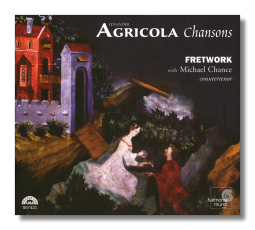
The Internet's Premier Classical Music Source
Related Links
-
Agricola Reviews
De La Rue Reviews - Latest Reviews
- More Reviews
-
By Composer
-
Collections
DVD & Blu-ray
Books
Concert Reviews
Articles/Interviews
Software
Audio
Search Amazon
Recommended Links
Site News
 CD Review
CD Review
Chansons & Viol Music

- Alexander Agricola: Chansons
- Comme femme I à 4
- Comme femme II à 3
- Comme femme III à 2
- De tous biens plaine I à 3
- De tous biens plaine II à 3
- De tous biens plaine III à 3
- De tous biens plaine IV à 3
- De tous biens plaine V à 3
- Dung aultre amer I à 4
- Dung aultre amer II à 4
- Dung aultre amer III à 3
- En actendant à 3
- Fortuna desperata à 6
- Je nay dueil à 4
- Pater meus agricola est à 3
- Se je fais bien à 3
- Tout à part moy I à 4
- Vostre hault bruit à 3
- Fabrice Fitch:
- Agricola I: Comme femme
- Agricola III/Obrecht Canon I: De tous biens plaine
- Ninot Le Petit:
- Si bibero
- Pierre de La Rue / Heinrich Isaac:
- Si Dormiero
Michael Chance, countertenor
Fretwork
Harmonia Mundi HMU907421
Last year (2006) was the 500th anniversary of the death of Alexander Agricola. To mark the occasion Fretwork joined with countertenor Michael Chance to present a disc of secular chansons and instrumental works. The program was actually conceived by Fabrice Fitch, a modern composer and musicologist who has a specialist interest in Agricola – and Johannes Ockeghem (Masses and Models). Indeed Fitch edited the edition used for this recording. There are two pieces by Fitch on the CD, first recordings of pieces inspired by Agricola; as well as two original pieces one each by Ninot le Petit and La Rue.
In his lifetime Agricola was considered one of the greatest of all European composers. For this CD the performers have chosen to illustrate his phenomenal inventiveness by grouping 'sets' of his melodies (many early polyphonic pieces were based on the same existing song) with corresponding instrumental variations for comparison. And varied they truly are: although clearly sharing the same source, the counterpoint of each new piece is fully explored by Fretwork; they leave us with a rich insight into what the originals have in common, as well as their differences. The sequence of these grouped sets is nicely broken by the Agricola chansons, the works of Fitch, Ninot Le Petit and la Rue. The two pieces by Fitch work well and are a welcome addition: they're not at all out of place, nor feel in any way at odds with the kind of short, melodic, open compositions of Agricola's which inspired them. One thinks of Volans or even a toned-down Schnittke. As a result the pace of the music is lively throughout and sustains interest. Indeed this alternation sets up an analogous tension in the listener's ear to that between, say, plainchant and polyphony in some performances of (early) renaissance Masses: each benefits from the sonorities (and expected sonorities) of the other.
There is lasting doubt about how much, and which, of Agricola's vocal output was actually written primarily to be sung. Chance sings on just four occasions here. Fretwork has chosen to concentrate on those pieces which survive without text and are more likely to have been intended for instrument-only performance. This tactic doesn't, however, sidestep the debate current amongst early music specialists about probable interchangeability between sung and purely instrumental composition. It merely contributes some persuasive and very enjoyable examples. These won't be for everyone, less because they may be 'inauthentic' – that's always hard to determine – but because, understandably, Fretwork confers upon these pieces a very rich Consort sound more redolent perhaps of Elizabethan composers. It's possible to argue that this obscures the melodic integrity and inventiveness of Agricola's lines. It's also always been an issue that what we have in these instrumental pieces was always unsingable anyway. The centerpiece of the CD is surely the celebrated Pater meus agricola est, a beautifully-woven and intricately toned flight of melody, an early 'fantasia', that will grow and grow on you.
As the informative and clear CD liner notes explain, it's possible to attribute contemporary (and subsequent) neglect of Agricola to his animated style, almost bizarre in what some have seen as playful eccentricity. Listen to some of the harmonies in Se je fais bien, for example. In Fretwork, Fitch and Chance he certainly has some persuasive advocates. He may also have been overlooked precisely because he was pioneering purely instrumental chansons at a time when the voice was still supreme.
Whatever your feeling about the musicology of this disc, Agricola is not exactly over-represented on CD so you can safely buy Chansons & Viol Music because of these gentle and committed performances. There's next to no overlap here with anything else available. On those few discs devoted exclusively to Agricola there are only two masses (both from A.N.S. Chorus, Hungaraton 32267 and 32011) and Ensemble Unicorn's Fortuna Desperata (Naxos 8.553840). If something apparently different from Josquin's world yet in Josquin's age and milieu appeals, don't hesitate to buy this beautiful, well chosen and expertly played disc.
Copyright © 2007, Mark Sealey




















